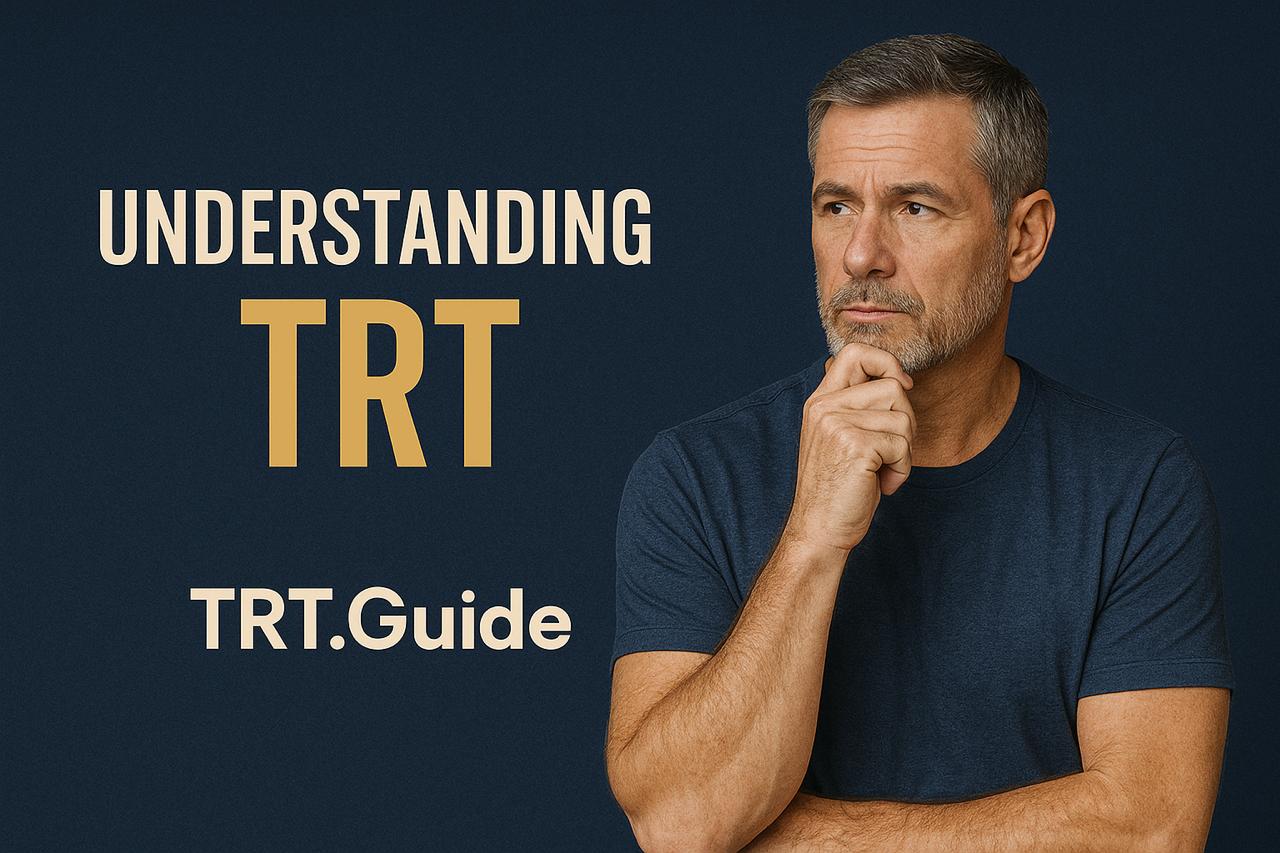When you are in deep thought and are weighing the positive and negative sides of discontinuing testosterone therapy, it is crucial to learn the possible effects of your decision on your body as well as your well-being. There are those who use testosterone therapy as a solution to the symptoms of low testosterone; but what if you decided to forego the treatment? The answer is multifaceted and will depend on the given situation.
Different things can emerge as a result of the cessation of testosterone therapy in your body. You might experience low energy, mood swings, and probably witness some physical changes in your body that can affect your daily routine. Such information on possible effects will make you become aware that you are making smart choices for your health to prepare for the subsequent steps in the right way. Let’s go over the side effects of this hormone replacement therapy that will be caused by the decision to stop it in more detail for you to know the options for the future and be ready.
Testosterone Therapy Sum Up
Testosterone therapy is a technique used to treat individuals with low testosterone (hypogonadism) by giving them testosterone to raise the levels of the hormone and thus prevent the symptoms of the disease. This type of therapy can undoubtedly bring back one’s vitality, brighten their mood, and maintain the muscles. The method is given through the use of injections, patches, gels, and pellets.
Some reasons why you might undergo such therapy are the following:
- Increased Energy: Many people with low testosterone feel extremely tired. Therapy can definitely help to revitalize such a person’s energy.
- Improving Mood: A man’s mood is greatly influenced by his testosterone level. Low testosterone can often lead to mood disorders. Therapy can really make a man emotionally stable.
- Building Muscle Mass: Testosterone is directly related to muscle building. Therapy helps with muscle growth and improving muscle strength.
Fat Distribution Changes
Another fat distribution change that could present itself after quitting testosterone therapy is the storage of more fat in specific areas of your body. Testosterone plays a significant role in the storage of fat around the body, mostly in the stomach area. Studies have been conducted, which has found that there is too much fat in the abdomen indicating a shift to this area which is at the heart of the problem as it can lead to some of the diseases.
One of the first things you may notice is the growth in the percentage of body fat, and the fat will accumulate especially at the level of the abdomen. This change in body composition even makes you look less good on the outside.Even if you find it difficult without a sure cure to compensate for the hormonal support, changing your food habits and giving yourself an exercise routine can help you control these changes.
Emotional and Psychological Impact
The consequences of the termination of the testosterone therapy are not limited to negative emotions only but impact the mind as well as it leads to psychological distress.. The affected individuals will have a multitude of difficulties of the kind that will be experienced in mental health challenges hence affecting day-to-day life.
Mood Swings and Depression
The patient can get ten times worse symptoms within a short period which means they are coping with the changes of hormones in their body. Moreover, the absence of testosterone can leave neurotransmitters unregulated, contributing further to the development of mood disorders. Therefore, seeking out professional help during this downtime is of great benefit as it not only helps to manage the diseases but also provides the coping strategies to apply.
Effects on Cognitive Function
It is possible that there will be a reduction in cognitive function in cases where a patient decides to discontinue testosterone treatment. People would have difficulty remembering, paying attention, or having a clear mind, and these instances do happen to people. Current studies indicate that testosterone has the function of improving cognitive processes through the stimulus of synaptic plasticity and the change in the growth of the brain’s neurons. On the flipside of a lack of proper testosterone levels, the onset and progression of cognitive decline can be remarkably fast.
Long-Term Health Risks
Discontinuing testosterone therapy is a factor that may lead to undesirable long-term health risks, the most severe of which is bone density and cardiovascular health impairment.
Bone Density and Osteoporosis
You will probably see a fall in your bone density when you’re no longer taking testosterone therapy. Most studies currently agree that hypogonadism can be a critical factor in the pace at which human bones erode, thus furthering the development of osteoporosis. Figures like an approximate 2% to 5% annually were presented to the public as the range on the likelihood of the loss of minerals provided from one’s bones when men lacking hormone replacement are examined. The reduction is often unnoticed until something serious occurs, hence the prevention of fractures becomes vital to bone health.
Additionally, workouts that improve tone and calcium-rich foods can be quite helpful but it is clear that the former will not compensate for the deficiency. Regular bone density checks can be useful to assess the state of your bones as they will enable you to detect any problem early enough and intervene before it is too late.
Cardiovascular Health Concerns
Heart health will be another concern if you no longer have testosterone therapy injected. The absence of sufficient amounts of testosterone may make the person prone to cardiac-related diseases. A study from many sources uncovered the fact that men suffering from low testosterone levels are more likely to have high blood pressure, abnormal cholesterol levels, and heart disease.
According to a particular study, the male subjects who suddenly stopped testosterone therapy and those who had not taken it at all were checked. As a result, the former group of people had a 40 percent increased risk of suffering from a heart attack during the first year when compared to the latter. It is the prescription for having good heart health i.e. having regular physical activities, a balanced diet, and doing regular check-ups even without availing the medication that remains still a problem. It is wise to seek professional advice on therapy changes in order that these risks can be effectively managed.
Considerations for Transitioning Off Therapy
Transitioning off testosterone therapy should be well-planned and under the guidance of a professional. There are several factors that can have a tremendous effect on this period of life.
Consulting with Healthcare Providers
Initiate a conversation with your healthcare provider before you stop your treatment. The provider will assess your present condition, explain withdrawal symptoms if any, and suggest possible ways to do it comfortably. The regular visits help monitor the levels of hormones and also help in recognition of the changes in energy, mood, and physical health. The doctor, possibly, will present alternative methods or therapies that can help in case symptoms appear. Be sure to explore the possible risks and the consequences that might occur in the long term. It is also necessary to engage in discussions about seeking proper help and support during the transition.
Gradual Reduction vs. Immediate Cessation
Stay on a reduction stage or stop your medication immediately, a choice priming your experience both models are. Tapering down the dosage step by step over a long period is the direction of the gradual reduction, the goal being the body’s adaptation to the new and lower testosterone levels. This way can help with the symptoms such as mood swings and fatigue.
Thus, the sudden stopping can shock your body, with stronger symptoms presenting themselves.
Conclusion
Decision to hang up on the measure of testosterone will certainly have profound effects on you in physical and mental spheres. Really, one might come under a variety of pressures alike having mood swings, energy drops, and even weakening his/her life pattern, all due to mood disorders and alterations in the energy levels experienced during the time period. Moreover, one’s physical transformation due to the possible muscle mass disappearing and the potential change of their fat could give them a surprise during this time.
Making sure to go at it carefully is very important. By demonstrating the best ways to cope with a possible withdrawal through a physicians’ network, one is set to go and will always be in a position to come up with a personalized plan that is unique to your condition. Most importantly, if you are aware that your remedy has been discontinued, it will not cost you much effort to secure your overall well-being and you can prevent dealing with your health twice through appropriate measures.
Furthermore, the support that you will give to your body by maintaining good health during this period of time will be a major milestone for your body adjustment.
Frequent Ask Questions
What happens when you stop testosterone therapy?
Termination of testosterone therapy might lead to several consequences. Namely, this change could bring about draining your power, irritability, the alteration of body mass and fat distribution. There is also one more dimension of the symptoms of the disease like hot flushes or night sweats.
How does stopping testosterone therapy affect muscle mass?
The suspension of testosterone therapy can result in a reduction of the total muscle mass by 5% to 10% in a few months. This decay directly results from a deficiency of protein synthesis, and levels of muscle repair, which are the leading causes of no strength and endurance.
What feelings may be experienced after discontinuing treatment of testosterone?
Mood swings, irritability, anxiety, or sadness are likely to be felt by patients as the immediate effects of testosterone therapy withdrawal. The study points out a correlation between the low level of testosterone and a higher percentage of depression, with the symptoms coming in most cases in weeks after the discontinuation.
Are there possible long-term health dangers after one gives up on therapy for testosterone substitution?
Yes, there are serious health hazards such as the gradual decrease of bone density leading to osteoporosis and a 40% higher risk of cardiovascular problems which can be incurred from ceasing testosterone therapy. One must be always vigilant and stay in touch with the doctor post-treatment.
Do you think a doctor should be consulted before discontinuing the treatment?
Unconditionally, yes. A doctor’s consultation is a mandatory prerequisite for a patient considering to alter or discontinue testosterone therapy. They will assist in evaluating your health, discussing any possible withdrawal symptoms, and also in providing counseling on a safe discontinue.
Is tapering off of testosterone therapy suggested?
Yes, taking off a small percentage of the therapy is usually recommended as a means to lessen the possibility of withdrawal and ultimately feel more comfortable about the change. The decision of choosing or not choosing this mode of approach lies more in finding a family doctor to provide more individualized advice.






